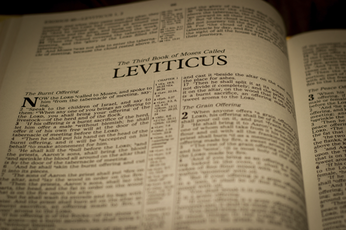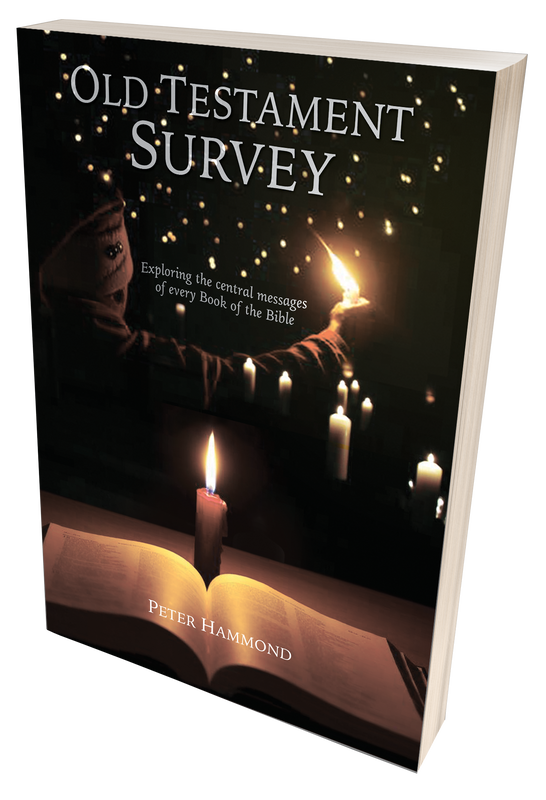
"You shall be holy, for I the Lord Your God am Holy." Leviticus 19:2
Genesis is a universal Book and it covers many centuries. Exodus, focuses on the Israelites deliverance from Egypt and it covers years. Leviticus deals with the priestly tribe of Levi and it covers just one month. In Genesis we see man ruined. In Exodus we see man redeemed. In Leviticus we see man reverencing God. Most of Leviticus is made up of direct instructions from Almighty God. More than any other Book in the Bible, Leviticus contains the Words of God to His people as to how a sinful people can be reconciled to a Holy God, and how to worship God acceptably. In the second half of Exodus, the Tabernacle is built. Leviticus focuses on how to worship God and how to live out our Faith in society. Exodus talks about God's approach to man. Leviticus deals with man's approach to God. Exodus is about the deliverance that God brought to His people. Leviticus is about the dedication of God's people to Him. Exodus is about God's grace in setting His people free. Leviticus shows how His people can show their gratitude to God for being set free.
We are Saved in order to serve.
Exodus shows how God saves His people. Leviticus explains how His people are to serve Him. Leviticus makes clear that God expects His people to be transformed and to be holy even as He is Holy. His people are not to be conformed to the pattern of the world. Sacrifice The wages of sin is death (Romans 6:23). The only way for a sinner to be reconciled to a Holy God is through sacrifice. "Without the shedding of blood there is no remission of sins." Hebrews 9:22 The five offerings (burnt offering, meal offering, peace offering, sin offering and trespass offering) are pictures of how sinful people are to be reconciled to a Holy God. All the sacrifices in the Book of Leviticus point to Jesus Christ as the Lamb of God who takes away the sins of the world (John 1:29). The burnt offering speaks of surrender. The meal offering: service. The peace offering: serenity. The sin offering: substitute. The trespass offering: satisfaction. We dedicate ourselves to God. He consecrates us to His service. "Take my life and let it be consecrated, Lord to Thee." The first part of Leviticus describes our way to God – Justification. The second part of Leviticus describes our walk with God – Sanctification. Consecrated Calendar The eight feasts are pictures of how God's people are to worship God acceptably. Leviticus makes it clear that God's people are not to approach Him just any way we like. God was very specific in Exodus as to how the Tabernacle was to be built. Everything had significance. In Leviticus He is even more specific as to how His people were to worship Him. The calendar was to begin with the Passover – The Feast of Unleavened Bread, which happened on the 15th day of the first month of the Hebrew New Year (March/April), to remember how God delivered the Israelites out of slavery in Egypt. On the day before the Passover began, a lamb had to be killed at the 9th hour (3pm). Three days later they had to offer the First Fruits of the harvest to God. Pentecost 50 days after the First Fruits they were to hold the Feast of Pentecost. This commemorated the day that the Law was given on Sinai. When the Law was given at Sinai, 3,000 people were put to death because of their sin. When the Holy Spirit was poured out on the praying disciples at Pentecost, 3,000 people were saved! As the Book of Hebrews makes clear, all the festivals of the people of Israel, including the Feasts of Trumpets, the Day of Atonement, and the Feast of Tabernacles, are all fulfilled in Jesus Christ, the Lamb of God who takes away the sins of the world, the First fruit of the Resurrection from the dead. He is also our Jubilee. Jubilee Every 50 years, there was to be a Jubilee where all debts were cancelled and all property reverted to the family who originally owned it. This was known as The Acceptable Day of the Lord. It was good news to the poor because captives would be set at liberty. When our Lord Jesus Christ declared in Nazareth: "The Spirit of the Lord is upon Me, because He has anointed Me to preach the Gospel to the poor; He has sent Me to heal the broken-hearted, to proclaim liberty to the captives and the recovery of sight to the blind, to set at liberty those who are oppressed; to proclaim the acceptable year of the Lord." One needs to understand Leviticus to appreciate the full significance of those momentous words. Luke 4:18-19 Rules for Living Leviticus distinguishes between the holy and the common, the clean and the unclean. Most people think in terms of good and bad, but the Bible distinguished between three areas: the Sinful, the Secular and the Sacred. There are two processes explained in Leviticus. The first is when Sacred, Godly and Holy things are profaned and become common. But just as there is a process of profaning the Holy to make it common and polluting the common to make it unclean, so there is a process of redeeming the situation, by cleansing the unclean and consecrating the common to make it Holy. Leviticus explains the downward process that profanes and pollutes and ends in death and the upward process of cleansing the unclean and consecrating the common to make it Holy. Holiness in Daily Living Leviticus 19 is the most important chapter of the Book as it spells out what Holiness means in daily life: We are to respect our parents, observe the Sabbath, honour God alone, respect the poor, respect foreigners, respect boundaries and property, honour our contracts, be considerate for the handicapped, respect life, conserve nature, protect life, and show integrity in all areas of life. The health of the body is shown to be most important. Body piercing and tattoos are expressly forbidden, as are occultism. We are to show special consideration for the poor, the deaf, the blind and the aged. Acceptable and unacceptable sexual relations are clearly spelled out and homosexuality and incest are expressly forbidden. Cross breeding of animals is forbidden, as is sowing mixed seed. God is a God of purity, and He prohibits mixing that which He has created for different purposes. Trust and Obey The dietary laws given in Leviticus can be shown to have good hygienic reasons to protect from disease and infection. However, God does not always give reasons for all His rules. His people are to trust and obey because of who God is, our Creator and Eternal Judge. With many of the Laws God is saying: "Do you trust Me?" The sacrifices in Leviticus speak of the blood that Saves. The feasts speak of the food that sustains. Seven Every seventh day was a Sabbath to the Lord. Every seventh year was a sabbatical year. Every seven times seven years was followed by a year of Jubilee. Pentecost was seven weeks after the Passover. In the seventh month were the feasts of Trumpets, Tabernacles and Atonement. Blessings and Curses Rewards are promised for those who trust and obey God. However severe consequences are warned for those who distrust and disobey God. Leviticus 26 spells out the blessings of obedience and the curses of disobedience. In Leviticus 10, a shocking example is recorded where the Lord sent fire to consume the two sons of Aaron, Nadab and Abihu who offered unauthorised fire before the Lord, contrary to His command (Leviticus 10:1-2). Quite clearly the Laws of God are a matter of life and death. Paul wrote to Timothy: "From childhood you have known the Holy Scriptures, which are able to make you wise for Salvation through Faith which is in Christ Jesus. All Scripture is given by inspiration of God, and is profitable for doctrine, for reproof, for correction, for instruction and righteousness, that the man of God may be complete, thoroughly equipped for every good work." 2 Timothy 3:15-17 When this was written, the New Testament did not yet exist. The Scriptures referred to here are the Old Testament. The Lord Jesus said: "Search the Scriptures for they bear witness to Me…" On the road to Emmaus, the Lord Jesus opened their understanding that they might comprehend the Scriptures: "All things must be fulfilled which were written in the Law of Moses and the prophets and Psalms concerning Me… Thus it is written and thus it was necessary for Christ to suffer and to rise from the dead the third day, and that Repentance and remission of sin should be preached in His Name to all nations beginning at Jerusalem." Luke 24:44-47 The Holiness of God There are over 90 references to Leviticus in the New Testament. A study of Leviticus reveals to us the Holiness of God. He hates evil. "Let us worship God with reverence and awe, for our God is a consuming fire." The Depravity of Man Leviticus shows the sinfulness of man. Human nature is capable of bestiality, incest, superstitions and abominations loathsome, vile and revolting to Almighty God. The sinfulness of man is seen not just in our polluting clean things, but also in profaning Holy things. The Lamb of God Leviticus also points to Jesus Christ as the Lamb of God who takes away the sins of the world, the perfect, spotless sacrifice. The just who gave His life in the place of the unjust. Leviticus also spells out how to live our lives in gratitude to Almighty God, obeying His Word in all areas of life. Dr. Peter Hammond Livingstone Fellowship P.O. Box 74 Newlands 7725 Cape Town South Africa Tel: 021-689-4480 Fax: 021-685-5884 Email: [email protected] Website: www.livingstonefellowship.co.za The full message as delivered at Livingstone Fellowship is available on audio CD.
0 Comments
Leave a Reply. |
OLD
TESTAMENT SURVEY ARTICLES
All
ARCHIVES |


 RSS Feed
RSS Feed